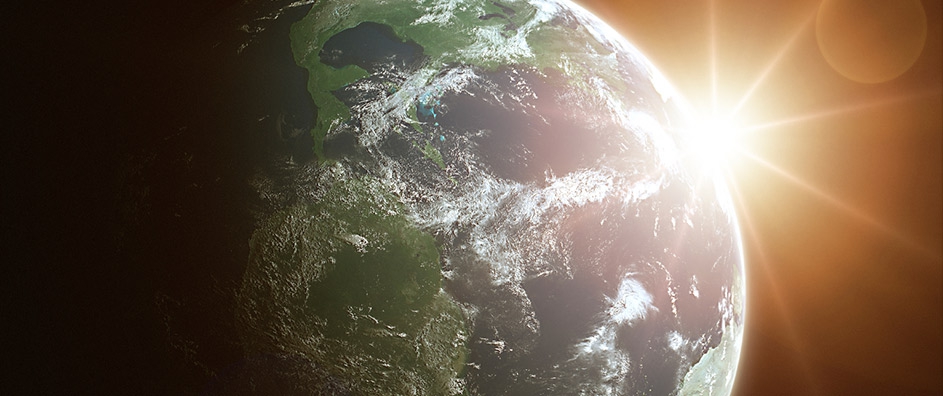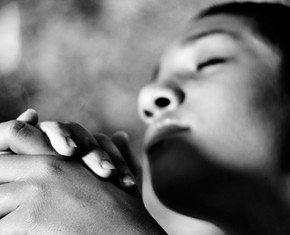The views expressed in our content reflect individual perspectives and do not represent the authoritative views of the Baha'i Faith.
In every Faith, God makes a promise to humanity.
In the Old Testament, when God addresses Moses, that explicit promise goes like this:
…if you will indeed obey my voice and keep my covenant, you shall be my treasured possession among all peoples, for all the earth is mine; and you shall be to me a kingdom of priests and a holy nation. These are the words that you shall speak to the people of Israel. – Exodus 19:5-6.
Called the Mosaic Covenant, God gave Moses the Ten Commandments, and in turn asked that the people agree to worship one Creator and obey those moral laws. In the New Testament of the Bible, a similar contract between God and humanity emerges, which Christians call the New Covenant:
For if that first covenant had been faultless, there would have been no occasion to look for a second. For he finds fault with them when he says: “Behold, the days are coming, declares the Lord, when I will establish a new covenant with the house of Israel and with the house of Judah, not like the covenant that I made with their fathers on the day when I took them by the hand to bring them out of the land of Egypt. For they did not continue in my covenant, and so I showed no concern for them, declares the Lord. For this is the covenant that I will make with the house of Israel after those days, declares the Lord: I will put my laws into their minds, and write them on their hearts, and I will be their God, and they shall be my people. And they shall not teach, each one his neighbor and each one his brother, saying, ’Know the Lord,’ for they shall all know me, from the least of them to the greatest. For I will be merciful toward their iniquities, and I will remember their sins no more.” In speaking of a new covenant, he makes the first one obsolete. And what is becoming obsolete and growing old is ready to vanish away. – Hebrews 8:7-13.
You can find the basic Christian view of the New Covenant—Jesus Christ initiating that agreement at the Last Supper by giving a new, “eleventh” commandment—in the Gospel of John:
A new commandment I give unto you, That ye love one another; as I have loved you, that ye also love one another. By this shall all men know that ye are my disciples, if ye have love one to another. —John 13:33-35.
In Islam, the concept of a covenant appears yet again, distinguishing faith from hypocrisy and asking believers to keep their promises to carry out God’s commandments:
Verily, God bids you do justice and good, and give to kindred (their due), and He forbids you to sin, and do wrong, and oppress; He admonishes you, haply ye may be mindful!
Fulfil God’s covenant when ye have covenanted, and break not your oaths after asseverating them, for ye thereby make God your surety; verily, God knows what ye do. – Qur’an, Sura 16
The Baha’i teachings take the concept of a covenant even further, linking it directly to the attainment of an eternal existence:
Today the pulsating power in the arteries of the body of the world is the spirit of the Covenant — the spirit which is the cause of life. Whosoever is vivified with this spirit, the freshness and beauty of life become manifest in him, he is baptized with the Holy Spirit, he is born again, is freed from oppression and tyranny, from heedlessness and harshness which deaden the spirit, and attains to everlasting life. Praise thou God that thou art firm in the Covenant and the Testament and art turning thy face to the Luminary of the world, His Highness Baha’u’llah. – Abdu’l-Baha, Star of the West, Volume 6, pp. 263-264.
Baha’is believe that only one everlasting covenant exists, and that it has always existed. Every prophet of God renews this ongoing covenant in a different way, but they all connect in one successive and progressive chain of revelation. To distinguish one version of that covenant from its predecessor, we call it the covenant of Abraham, the covenant of Moses, the new covenant of Christ or the covenant of Muhammad—but in reality, God offers us this same essential covenant in every new religious era and dispensation. He promises never to leave his creation without his wisdom and direction.
We know this continuous covenant by many names. In Genesis, the story of Adam and Eve and the Garden of Eden tells the story of the covenant, as does the tale of Noah and the Flood. Noah’s Ark represents the covenant, and Noah’s covenant with God, which involves a promise to never again destroy all life on Earth, uses a rainbow as a symbol of that everlasting agreement. In Christianity, Jesus made a covenant with his followers to turn to Peter, “the rock” of the foundation of his church. In Islam, the famous account of Fama-Gadeer instructs Muhammad’s followers to turn to his successor Ali. In the Baha’i Faith, Baha’u’llah’s covenant—which promises a subsequent revelation, and appoints Abdu’l-Baha as the central authoritative interpreter and exemplar of his teachings—asks each believer to faithfully turn to that Center of the Covenant for their guidance and inspiration.
Seen from this uninterrupted, perpetual perspective, the Baha’i teachings tell us that our ongoing covenant with God represents the inspirational and spiritual source of progress and order in the world:
The Covenant is an Orb which shines and gleams forth unto the universe. Verily, its lights will dispel darkness, its sea will cast out the froth of suspicion upon the shores of perdition. Verily, naught in the world can resist the power of the Kingdom. Should all mankind assemble, could they prevent the sun from giving its light, the winds from their blowing, the clouds from their showers, the mountains from their firmness or the stars from their beaming? No! by the Lord, the Clement. Everything (in the world) is subject to corruption, but the Covenant of thy Lord shall continue to pervade all regions. – Abdu’l-Baha, Star of the West, Volume 3, p. 170.
















Comments
Sign in or create an account
Continue with Googleor